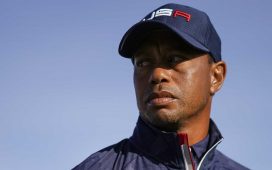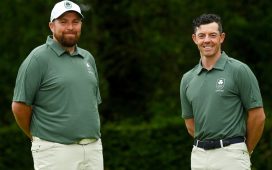David Maher, the president and CEO of Acushnet, has weighed in on golf’s distance debate fifteen days after the USGA and R&A jointly released their long-awaited Distance Insights Report that made it clear they do not want the gradual increase in distance and course length to continue.
“We believe the conclusions drawn in this Report undervalue the skill and athleticism of the game’s very best players and focus far too much on the top of the men’s professional game and project this on golf and golfers as a whole,” Maher wrote in a letter posted Wednesday on Titleist’s website. “Furthermore, we believe that existing equipment regulations effectively govern the prospects of any significant increases in hitting distance by the game’s longest hitters.”
Without giving specifics, the ruling bodies mentioned two possible solutions in their report released Feb. 14: rolling back equipment as a whole with a new set of distance standards, or creating a local rule that requires a different set of equipment standards for elite competitions. No time frame for any action was set.
The ruling bodies’ report notes that over the last 100 years, golfers have been hitting the ball farther and farther, and golf courses have been getting longer and longer to maintain the challenges of the game and test a variety of skills. Data collected by the game’s governing bodies shows longer courses require more water, fertilizer and dollars to maintain. The USGA and R&A said that as costs increase, many courses will not be able to keep up with possible distance increases if nothing is done, and that could bad for the long-term future of the game.
Maher, in charge of the company that makes the most popular golf balls at both the professional and recreational levels, sees things differently.
“The Report indicates the next step in the Distance Insights Project will focus on evaluating potential changes to the equipment rules to curb innovation and limit any additional hitting distance,” he writes. “Golf equipment (clubs and balls) has historically been highly regulated, and these regulations have been effective in setting upper limits on equipment performance and ensuring that the best golfers separate themselves with their talent, skill, and training while using equipment best suited to their games.”
He goes on to note that the PGA Tour driving distance average has decreased in six of the past 13 seasons including last year, when it dipped to 293.9 yards from 296.1 yards in 2018.
“We believe this helps to affirm the effectiveness of regulatory efforts, particularly those adopted since the early 2000s, which continue to achieve their desired intent of setting boundaries around future distance increases while also rewarding skill and encouraging innovation.”
Maher also makes it clear Titleist is not interested in advancing the idea of a local rule that would mandate golfers at specific events use distance-reducing equipment.
“We believe that playing by a unified set of rules coalesces our game, is an essential part of its global understanding and appeal, and eliminates the inconsistency and instability that would come from multiple sets of equipment standards,” he writes.
In other words, Acushnet and Titleist are not in favor of bifurcation.








